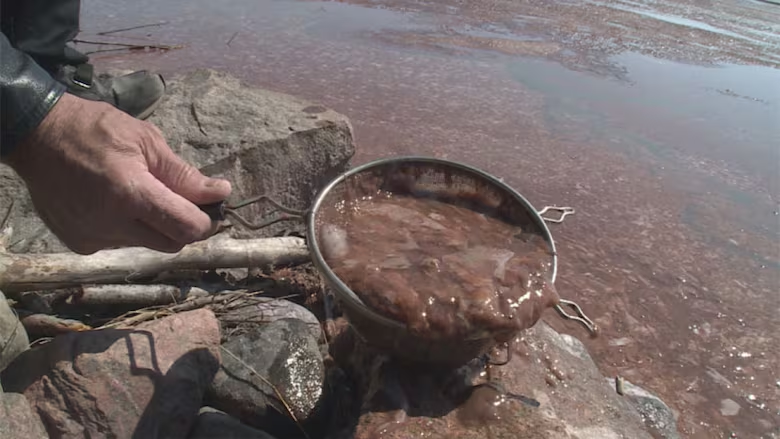Algae bloom coats Yellowknife's Jackfish Lake with sludge
Health officials say people should wear gloves when handling fish from the lake

It's brown, slimy and invading a section of Yellowknife's Jackfish Lake.
Daniel Lafond, who has fished the lake for years, first noticed the rust-coloured sludge during the spring melt.
"Check out that big piece," he says. "It's like liver."
First noticed in 2013, the N.W.T. Department of Environment and Natural Resources identified it last year as blue-green algae.
The department can't say exactly what's causing it to grow, but algae thrive in warm, nutrient-rich waters.
The Jackfish power plant, Yellowknife's back-up diesel-fuelled facility, sits at the other end of the lake. It brings in water to cool its diesel generators and pumps warm water back into the lake, but Pam Coulter, a spokesperson for the N.W.T. Power Corporation, says it's not doing anything out the ordinary.
The corporation did use the Jackfish generators more than usual last year, but Coulter said that's happened in the past with no resulting algae bloom.
Not a public health issue
Dr. Andre Corriveau, N.W.T.'s Chief Medical Officer of Health, says at this point it's not a public health issue as the lake isn't a water source for the city and it has no public beaches.

He says algae generally don't harm fish but, as a precautionary measure, people should wear gloves when handling fish from any lake infested with blue-green algae.
"Some types do have toxins and cause bad rashes," he said. "Some of them, if you drink the water, they cause toxicity to the liver."
It's advice Lafond is already following.
"I won't touch the fish," he says.
ENR plans to do follow-up tests this year to learn more about the algae and how quickly it's growing.